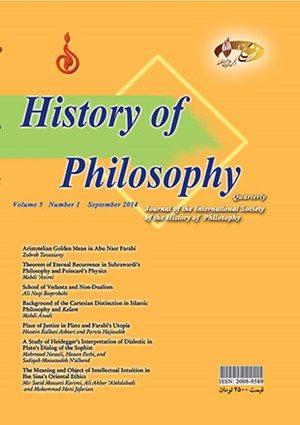A Study of Heidegger’s Interpretation of Dialectic in Plato’s Dialog of the Sophist
Subject Areas : Philosophical thoughts in ancient Iran
1 -
Keywords: Dialectic Plato Aristotle Heidegger Existence Principial non-principial ,
Abstract :
The term dialectic has a Greek root and enjoys a historical background as long as that of philosophy itself. This term has been employed by most philosophers at all times and has undergone some changes in terms of meaning in line with the differences in the views of different philosophers. The present paper aims to recount, examine, and evaluate Heidegger’s interpretation of the word “dialectic” as used by Plato. Heidegger’s interpretation of Plato’s dialectic is other than the common interpretations provided by most interpreters. While examining the interpretations given by the philosophers preceding him, Heidegger enters a dialog with them and believes that he has observed the norms of justice in this dialog while granting some freshness and beauty to their interpretations through employing a specific composing style and arrangement of ideas. At the same time, he has remained loyal to the interpreted text. In fact, while having a dialog with philosophers (particularly, Plato and Aristotle) and interpreting their views, Heidegger tries to remain objective and portray a new and unprecedented picture of their thoughts. In this paper, the writers have evaluated Heidegger’s loyalty to the thoughts of his intended philosopher (Plato) and, while exploring Platonic dialectic in the light of Heidegger’s philosophy, review the latter’s interpretation of this particular idea.
ارسطو، متافيزيک، ترجمه شرف¬الدين خراساني (شرف)، تهران، انتشارات حکمت، 1379. #
افلاطون، دوره آثار افلاطون، ترجمه محمد حسن لطفي، تهران، شركت سهامي انتشارات خوارزمي، 1380. #
احمدي، بابک، ساختار و تأويل متن، تهران، نشر مرکز، 1391. #
احمدي، بابک، هايدگر و پرسش بنيادين، تهران، نشر مرکز، 1384. #
فتحي، حسن، «ديالكتيك در فلسفه افلاطون»، نشرية دانشكده ادبيات و علوم انساني، ش 186، 1382. #
فتحي، حسن؛ موسي¬زاده، صديقه، «ديالکتيک هگل: سنتزي از ديالکتيک کانت در برابر ديالکتيک افلاطون»، نشريه انجمن بين¬المللي تاريخ فلسفه، ش 5، ص 49-80، 1390. #
دارتيگ، آندره، پديدارشناسي چيست؟، ترجمه¬ محمود نوالي، تهران، سازمان مطالعه و تدوين کتب علوم انساني دانشگاهها (سمت)، 1376. #
کوروز، موريس، فلسفه¬ هايدگر، ترجمه¬ محمود نوالي، تهران، انتشارات حکمت، 1379. #
کريچلي، سيمون، «ساخت¬زدايي و دريدا»، ترجمه حسن فتحي، نامه فرهنگ، ش 36، ص 127-133. #
گاتري، دبليو. كي. سي. تاريخ فلسفه يونان (ج 16)، افلاطون (4)، زبانشناسي و محاورات انتقادي، ترجمه حسن فتحي، تهران، انتشارت فكر روز، 1377. #
هايدگر، مارتين، وجود و زمان، ترجمه¬ محمود نوالي، تبريز، انتشارات دانشگاه تبريز، 1391. #
هايدگر، مارتين، هستي و زمان، ترجمه عبدالکريم رشيديان، تهران، انتشارات ني، 1389. #
هايدگر، مارتين، هستي و زمان، ترجمه¬ سياوش جمادي، تهران، انتشارات ققنوس، 1386. #
Hamliton, E. & H.Cairns, Plato, The Collected Dialogues, published. by Princeton University Press, 1989. #
Heidegger, M., Plato’s Sophist, translated into English by Richard Rojcewicz and Andre Schuwer, Indiana University Press, 2003. #
Inwood, M., A Heidegger Dictionary, Blackwell Published, 1999. #
Liddle, H. G. and Scott, R., Greek-English Lecxicon, Oxford University Press, 1978. #
Safranski, R., Martin Heidegger: Between Good and Evil, translated into English by Ewald Osers, Harvard University Press, 1998. #


